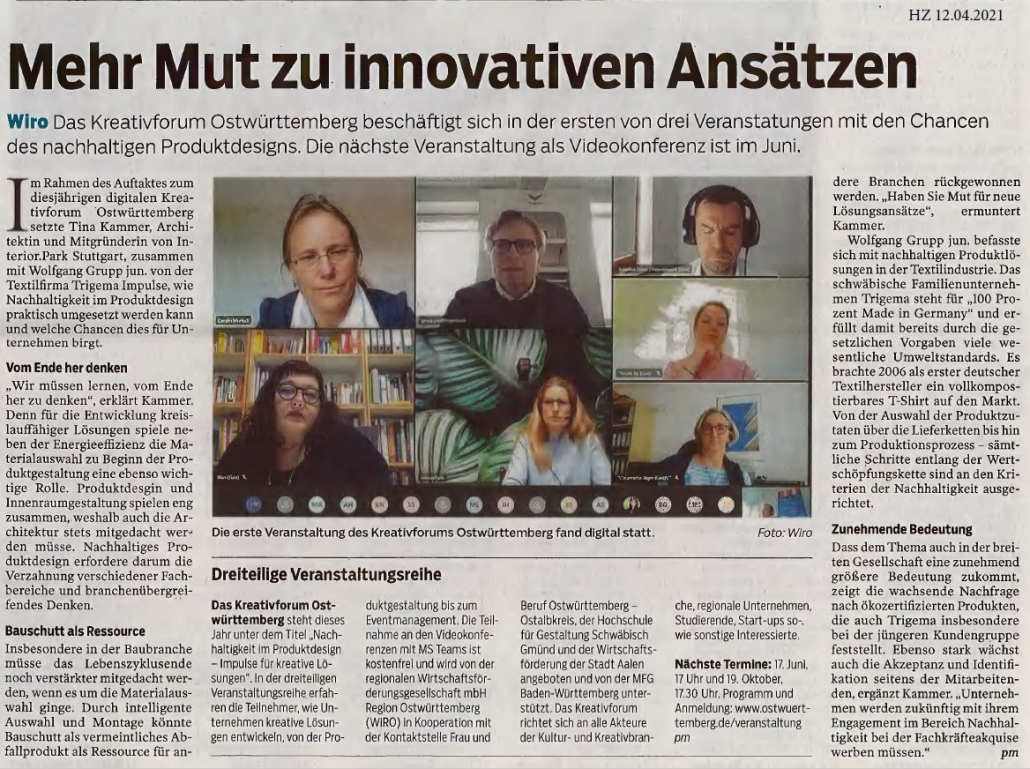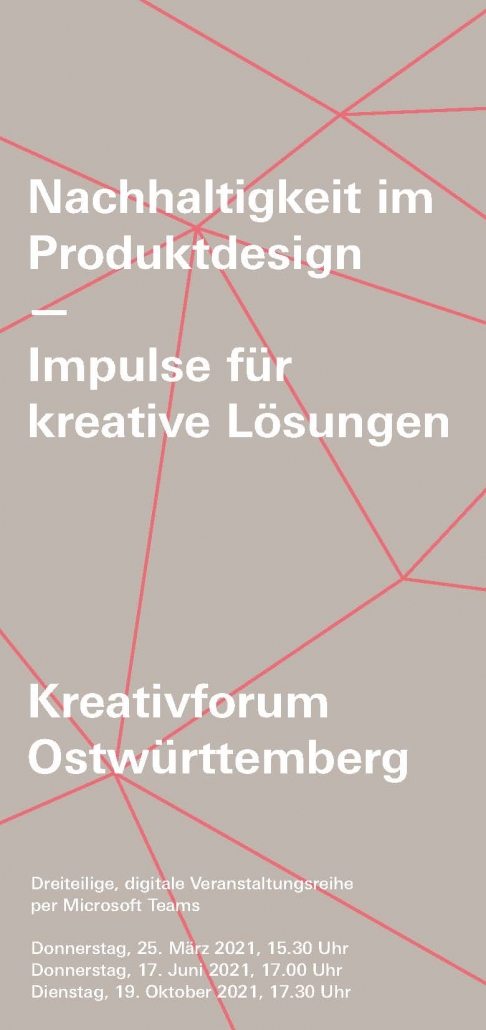Design is the main starting point for sustainable developments worldwide
Thursday, March 25, 2021, 3.30 p.m. – 4.30 p.m.
Lecture by Tina Kammer, Dipl. Ing. Architect, InteriorPark.
Circular economy is increasingly becoming the common habitus of many companies. But what does that actually mean? What potential does this result for the design process and new business models? Tina Kammer sheds light on the status quo and gives insights into practice.
The event of Wiro, the business development agency for the East Wuerttemberg region, is carried out as a live stream.
Sustainability in product design
Green issues move society. And companies have also discovered the topic for themselves, because sustainability is playing an increasingly important role in product development and in the development of new business models.
Does sustainability move creative people? Are creative companies, with their flexible structures and unconventional ways of thinking, perhaps even better positioned for the requirements of a future that will change dramatically as a result of climate change and environmental degradation?
Impulses for creative solutions
You can find out how companies develop creative solutions, from product design to event management, in the three-part digital creative forum Ostwuerttemberg on March 25, June 17 and October 19, 2021.
The Wirtschaftsförderungsgesellschaft mbH Region Ostwuerttemberg (WiRO), the contact point women and work Ostwuerttemberg – Ostalbkreis, the Schwäbisch Gmünd University of Design and the economic development of the city of Aalen invite all players in the cultural and creative sector, regional companies from industry and craft, students, start-up Ups as well as interested citizens cordially invite themselves to actively exchange ideas in this year’s creative forum on the topic of sustainability in product design, to network with experts on the topic of sustainability and to get to know current research approaches, application and product examples in the context of impulse lectures. The three-part digital event series is supported by the media and film company MFG Baden-Württemberg.
Thursday, March 25, 2021, 3.30 p.m. – 4.30 p.m.
Design is the main starting point for sustainable developments worldwide
Tina Kammer, Dipl. Ing. Architect, InteriorPark.
Circular economy is increasingly becoming the common habitus of many companies. But what does that actually mean? What potential does this result for the design process and new business models? Tina Kammer sheds light on the status quo and gives insights into practice.
Sustainability in textile production using the example of the company TRIGEMA Inh. W. Grupp e.K.
Wolfgang Grupp jun. | B2B sales and IT project manager, Company TRIGEMA Inh. W. Grupp e.K.
With a C2C collection, which is made from 100% recyclable material, TRIGEMA proves that textile production can be based very closely on the system of nature. This means that resources are not consumed, but needed.
Thursday, June 17, 2021, 5 p.m. – 6 p.m.
Added value through cycles
Jeannette Jäger, Managing Director Consulting Jäger GmbH, Filderstadt
Thinking holistically in cycles offers enormous opportunities for sustainable, successful corporate development. Inspirational examples from practice show what it takes, how it can succeed and what added value can be generated.
Tuesday, October 19, 2021, 5.30 p.m. – 6.30 p.m.
Sustainability as an opportunity – innovative products and services with eco-design
Prof. Matthias Held, Designer and professor of product design, HfG Schwäbisch Gmünd
Taking ecological criteria into account in the development of products and services can also be seen as an opportunity that ultimately ensures the company’s success. This approach is to be illustrated using examples.
Sustainability and circular economy at Aalen University
Vanessa Vanini, Department for Sustainable Development, Degree in Industrial Engineering, Aalen University
In a sustainable circular economy, materials and substances should be used in such a way that they create benefits in products for as long as possible, can be recovered for future production processes and are therefore not irretrievably lost as waste. Recycling and how events can be organized more sustainably is being researched and tested at Aalen University.




